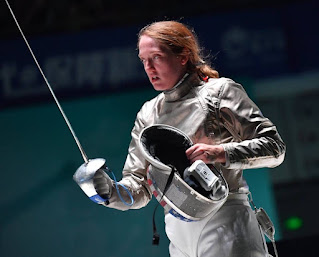From Sabers to Syringes: Olympic Fencer Embarks on Military Medical Career at USU
By MC3 Brooks Smith
“The whole point of fencing is to win the bout regardless of the opponent or outside circumstances,” says Navy Ensign Eliza Stone.
The Olympic fencer joined the Uniformed Services University of the Health Sciences (USU) School of Medicine this year. She brings a proclivity towards being tenacious and driven and knows a thing or two about working alongside teammates who perpetually uplift one another. She foresees these skills coming in handy as she works her way through medical school and embarks on a career as a military physician.
 |
| Navy Ensign Eliza Stone earned a spot on the 2021 Tokyo Olympics USA team. Today, she is a member of the USU School of Medicine's Class of 2026. (Photo courtesy of Navy Ensign Eliza Stone) |
Stone grew up in Chicago and was homeschooled with her two siblings. This made it nearly impossible to do large team sports. At first, she took up ballet, but that did not stick. Eventually, they found fencing, something the three of them could enjoy together.
“My sister and I had started out in ballet, but my brother wanted to find something else. I remember that around that time we had just seen the original Star Wars movies for the first time, too, and were in love with the honor and mysticism of these saber-wielding knights as corny as that sounds, so when my dad found a flier for beginning kid fencing classes at a local club, we were all very excited to go,” Stone says.
The split-second decision making, the use of technique, and the ability to improve with every win and loss had Stone hooked. She had become a fencer through and through.
Her fencing career came with many supporters, in addition to her family. Khristo Etropolski, an Olympian who participated in the 1980 and 1988 games, joined her club as a coach only two weeks after the siblings had joined. He knew how to inspire the kids at the club and make the sport enjoyable while helping their understanding of fencing.
With his support, Stone became highly ranked in the sport and when she started college, made the Princeton University’s varsity fencing team with her siblings. This team later went on to become the 2013 NCAA national championship team.
With college coming to an end, most athletes stop and accept that this was the peak of their sports accomplishments, but Stone decided to look further. She decided that she would look at the international circuit.
After just one year in this circuit, she joined the U.S. team. Her coach at the time, Oleg Stetsiv, helped her secure her title as a top international competitor.
“He knew the challenges of being a national team fencer and had a different approach to handling the psychological pressures involved. He reshaped me again as an athlete, and without him I wouldn’t have reached the top of the international crowd,” says Stone.
With his support she would ultimately rank fourth in the sport. She medaled in the 2018 World Championship, won the 2019 Pan American Games, and made it to the 2020 Olympics in Japan.
“Going to Tokyo was one of the biggest honors of my life because it was the culmination of years and years of hard work,” says Stone.
Having missed the 2016 Olympic Games in Rio de Janeiro, Stone says it was a “roller coaster” to climb back and make it to the Tokyo Olympics. It was an overwhelming experience for her to finally get to walk out at the Opening Ceremonies, knowing her family was watching her represent her country on a global stage.
While competing at this international level, a seed had been growing that had been planted all the way back in her childhood. Stone’s grandfathers were doctors in the Army and Navy during World War II, one of whom was among those in the Pearl Harbor attack. The other served in Australia.
 |
| Navy Ensign Eliza Stone competed in the World Championship as a member of Team USA. She would go on to be ranked fourth in women's fencing. (Photo courtesy of Navy Ensign Eliza Stone) |
“In college, I studied political philosophy and the ideas behind how to construct a perfect society, using whatever ideals and experiences you think might be most effective in producing a happy and productive society. It was very esoteric stuff,” she explains. “But studying that made me think about how I ought to be fitting into the bigger picture … The idea of utility stuck in my mind. When I tried to find out how to be useful, I kept coming back to medicine. The idea of serving my country and taking part in humanitarian missions and supporting communities around the world as a physician especially fit into my idea of being as useful as possible … once again, why I chose military medicine.”
With her decision made, Stone went on to complete her post-baccalaureate premedical program at Rider University. Even though she has moved on toward the future, the lessons Stone learned throughout her fencing career will stay with her and influence her military career.
“No one makes it to medical school without a huge amount of focus and dedication and ability to perform under pressure,” Stone says. “So, I’m honored to have been allowed to join the community here at USU, and to be included as a member of the class of 2026!”



